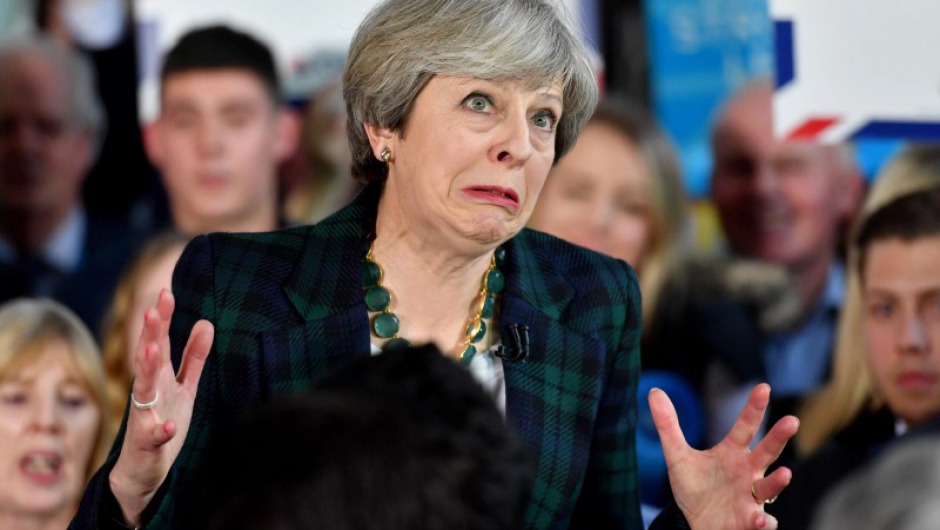Copywriting the election
20 Jun 2017

An examination of the slogans used by the main political parties that defined their election campaigns to June 2017
Yes, this piece includes a considerable amount of hindsight. But that might mean it’s more accurate.
I have used only the campaigns of those parties who had MPs both before and after the election, and so give the number of parties a reasonable and understandable limit, but also omitted the Northern Ireland parties. While one, the DUP, is suddenly the kingmaker in parliament their role in the election was limited to the local, not the national. The SNP's showing could have been decisive, however.
Conservative: Strong and stable in the national interest
Listening to the literati, you would imagine Theresa May had won the election with a significant majority from the slogan alone. Benedict Pringle's take in Campaign was typical.
Often shortened just to “strong and stable”, it presented well as a pointed contrast to the apparent bumbling of Jeremy Corbyn.
It did indeed seem to be a great slogan: gently alliterative and impossible to misunderstand. Clear in meaning and concrete in tone. However as many an adman will tell you, sometimes when the advertising is better than the product, this can create a problem.
In this case the product, Theresa May, veered far from the slogan by flip-flopping and u-turning on key issues, and then seeming remote and robotic in interviews.
It’s certainly possible that this banality was an active part of the campaign – to appear boring to reinforce the notion of ‘strong and stable’ and possibly to put off younger voters from voting at all.
Either way, by tactic or by tardiness, this scheme backfired spectacularly.
With u-turns on major policy and clear discomfort from the process of the election, May appeared remote, flustered or even frightened – not ‘strong and stable’ at all.
In the end the slogan accelerated May’s demise. The single moment that cemented May's fall was her failure to attent the TV debate that Corbyn had decided to attend earlier in the day. All Corbyn had to do was turn up and not make a mess of anything. In fact he performed well, but May's absence completed her failure.
Strong and Stable is a fine slogan, but when you demonstrate the opposite voters cannot hold this cognitive dissonance in their heads long before acknowledging that something is amiss.
Yes the Conservatives emerged as the largest party, but they lost seats and an overall majority. As May called the election to reinforce her position, the resulting victory seems at worst hubris, at best pyrrhic.
As Brian Millar says, the slogan's brutal simplicity was its downfall.
Labour: For the many not the few
Labour’s original slogan was going to be “Standing up for you” but switched at the last minute for ‘For the many not the few’. Many found the slogan to be bland, a run of the mill socialist message.
Some went further and claimed Corbyn has made a misstep by using the term ‘few’, previously used by Churchill to refer to the brave pilots protecting our shores from invasion in the Battle of Britain, “Never in the field of human conflict was so much owed by so many to so few”.
But of course Corbyn referred to a very different ‘few’, the 1% wealthiest, corporations with influence and other powerful bodies.
While nobody spotted it until the very end of the campaign, the line is actually taken from Percy Bysshe Shelley’s poem ‘The Masque of Anarchy’ written in 1819 to commemorate the Peterloo Massacre which took place in Manchester earlier that year, when cavalry were sent into a huge throng of protesters, killing 15 and injuring hundreds. The event reinforced radicalism nationwide.
The poem is about the righteous defiance building amongst the downtrodden in the face of violence. The message predates much of the non-violence of Mahatma Ghandi, who used the poem extensively during his long campaign against British rule. There’s a determinedly socialist message in the final line, “Ye are many – they are few.” Perfect for the determinedly socialist Corbyn.
But the success of this slogan from unpromising beginnings has to be placed in context. Perhaps on its own it may have been another footnote - not a bad slogan, but not stand-out. But against the Conservatives’ slogan it articulated something bigger. If the Conservatives aren’t ‘strong and stable’, what are they?
Corbyn captured the public mood and an appetite, possibly unknown beforehand, amongst the young for socialism, or something like it. Tony Blair’s New Labour abandoned socialism because it was considered to be unelectable. Perhaps this was right at the time. According to the current state of play it seems to be back in vogue and while he came second in the election, Corbyn seems very much the leader and even prime ministerial since the election and is now turning 'strong and stable' and the secondary 'coalition of chaos' to his advantage.
Corbyn's message of hope contrasted well with May's glum picture of the future.
Liberal Democrats: Change Britain’s future
Under Tim Farron's spirited leadership the Liberal Democrats campaigned on a bin-Brexit-or-minimise-Brexit ticket.
The slogan addressed this specifically, looking at a long and very difficult period of negotiations and at the end find a Brexit which whatver the outcome - hard or soft - will weaken our national position. That's the narrative they want to change.
Farron's interviews and debates allowed him to articulate this plan very clearly, but in many of the former the message became lost amongst questions about his religious beliefs (Farron is a committed Christian) and his party's liberal attitudes to subjects like gay marriage or abortion.
Interestingly, as Theresa May called the Brexit election, the LIberal Democrats were the only major party to stick to this narrative and explicitly campaign about Brexit.
The result was a curate's egg - good in parts. The Liberal Demmmocrats recovered many, but not all, of the seats lost in the 2015 election including leadership contender Jo Swinson, but lost major players like former leader Nick Clegg.
There was some leverage from campaigning against Brexit but the election very quickly mutated from the Brexit election to the conflict between Labour and Conservative, north and south, with some Brexit and no Brexit in there, but how these pieces fit together is complicated and will be picked-over for months and years to come.
SNP: Take back control
Another campaign with a single focus, this time on Scottish independence. This one is a little confusing - the manifesto uses the term 'Stronger for Scotland', but the slogan used tended to be 'Take back control'.
Following the 2015 election the SNP quite rightly felt that another referendum on Scottish independence was their perogative.
The SNP addded to this an anti-Brexit ticket, saying an independent Scotland would aim to stay within the EU.
While she is an accomplished performer, Nicola Sturgeon made a significant miscalculation.
Yes the SNP had an apparent mandate. What she did not anticipate was the absolute absence of appetite for another referendum.
Scotland had:
- 2014: independence referendum
- 2015: national election
- 2016: brexit referendum
- 2017: national election
They had had enough, basically. 'Take back control' could not be clearer but it was neither what the electorate wanted to explore. It's also one of the slogans used by the anti-EU campaigns in 2016 generating something of a mixed-message for those who are pro-EU.
Green: A confident and caring Britain
The Green party began the election with the prospect of doubling or even triping their representation in parliament.
It wasn't to be.
Caroline Lucas did very well in the national debates. Her problem was not her performance, but that of Jeremy Corbyn. Corbyn's Labour mirrored many Green policies, making the choice between Green and Labour a much more difficult proposition than in the past.
The Greens faced this precise problem. 'A confident and caring Britain' could very easily have been a Labour slogan. While the Green were magnanimous about this and didn't discourage the prospect of voting tactically to confront the Conservatives.
In this way the Greens didn't so much stand for something, but against the Conservatives - part of the imagined 'coalition of chaos'.
Plaid Cymru: Defending Wales
Like the SNP, Plaid Cymru's appeal seems to wax and wane with elections, decimated under the Blair years, now under attack from Labour, the Conservatives and Liberal Democrats.
This makes Wales a conundrum. On paper it should have voted to remain in the EU referendum, but voted decisively to leave. One of the birthplaces of Labour, now tilting towards the Conservatives.
Defending Wales prompts a question: against what? The EU? Plaid is strong pro-EU. The Conservatives? Wales is slowly turning Conservative. The English? There is little or no appetite for a leave referendum in Wales. All this leaves the question hanginging.
Leader Leanne Wood has been a consistently strong performer in leader debates, shaming two consecutive UKIP leaders in two consecutive debates shows she wears her heart on her sleeve, refreshing in a politician.
But such an ambiguous message leaves Plaid adrift.
Conclusion
If we think of slogans like a suit of clothing, worn by the leader then this becomes the story of two messages and two perceptions.
First is Theresa May, presumably wearing a sober power suit, maybe something like the character Alexis Colby wore in Dynasty. On first glance it looks amazing. Closer inspection shows it's actually rather dated and the seams are imprecise or fraying.
Then comes Corbyn, as geography teacher in brown cords and probably a jacket with patches on the elbows. He looks nice but not really terribly good. But look again and he seems better than first though. It's growing on me...

Please login to comment.
Comments